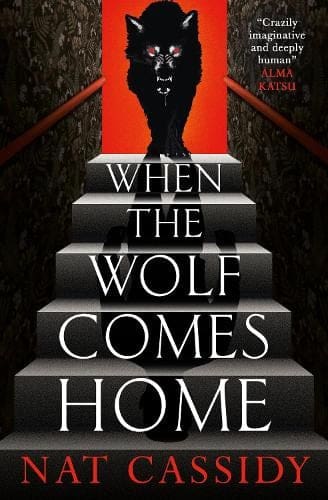
Synopsis:
One night, Jess, a struggling actress, finds a five-year-old runaway hiding in the bushes outside her apartment. After a violent, bloody encounter with the boy’s father, she and the boy find themselves running for their lives.
As they attempt to evade the boy’s increasingly desperate father, Jess slowly comes to a horrifying understanding of the butchery that follows them―the boy can turn his every fear into reality.
And when the wolf finally comes home, no one will be spared.
Review:
Fear is an emotion integral to the horror genre. Arguably, it revolves around it entirely, and for the majority of my childhood it was something I avoided completely. Case in point: when I was 11 my Dad offered to watch “Jaws,” with us, whilst my brother gave it a go (and inevitably screamed and left the room 5 minutes in) I refused from the very get-go, opting to watch Smurfs with my mum upstairs.
Of course my relationship with fear, anxiety, and horror has evolved (at least a little, I still won’t snorkel) and that’s a phenomenon that Nat Cassidy explores in “When The Wolf Comes Home,” which is easily the first 5 star read of the year.
Far from your average werewolf book, Cassidy delivers a bleak, propulsive, snarling beast of a novel that could not be better executed, from its characters (including the Loch Ness monster) to its prose. Horror at its most unflinching and imaginative, this is a novel that gnaws at questions of fatherhood, intention and fear. My eternal thanks to Titan for the ARC- you’ll want to pick it up April 22nd. It’s raw, it’s relentless, and you may not come out of the other side unscathed.
Jess has a particularly terrible shift at her terrible job at a terrible diner, and finds herself stuck with a dirty needle. She rushes home, and is in the midst of calming herself with a beer and googling her symptoms, when she spots something. A little boy. She takes him back to her apartment, and that’s when things well and truly kick off. A strange altercation outside is abruptly cut off by a 9ft bear, wolf thing. Jess’ roommate is dead, her apartment is ruined, and she’s stuck with this nameless little boy, who insists that thing is his dad.
“When The Wolf Comes Home,” is a book about intention and reality, about the burden of protection. Jess finds herself assuming the role of protector. She is a single struggling actor, she does not want to be looking after this child, especially one this fragile. Thrust into the unexpected role of guardian she finds herself lying, manipulating, telling white lies to put his active mind at ease. In many ways she makes similar mistakes to the man they’re running from.
That brings us on to the wolf. That character explores the thin line between predator and protector, reality vs intention. This chasm that even our best-laid, most well-intentioned plans can be swallowed up by. Control can be passed off as love, care can edge into cruelty, and shielding can be indistinguishable from possession. The act of caring for someone often comes with strings attached, and those strings can sometimes gradually become chains. Jess herself is flitting between grief and complete disregard for the recent death of her own estranged father- she initially finds herself unable to believe the kiddo’s claims, but empathetic in regard to the daddy issues. It’s a reminder that sometimes the people we love can fail, keep secrets, let us down. Nat himself probably sums it up best with “All Dads Are Motherfuckers.”
“When The Wolf Comes Home,” demonstrates the intensity of fear. How it can shape and warp reality, how it can influence our actions, how it can motivate us, paralyze us, act as a catalyst. In this novel fear is less of an emotion or a feeling and more of an architect, something that impacts and reshapes not just the actions of the characters but the very fabric of the world that they live in. There is one especially tremendous passage involving FBI special agent Santos, that is a contender for one of the most grisly yet poignant and gorgeous passages in horror literature. I digress. For Jess, the relentless presence of anxiety acts as a motivator and a tormentor. In moments of stark terror (evil cartoon characters who are particularly animated, the literal loch ness monster, a wolf that is as big and bad as they come) Jess discovers reserves of strength. Fear may be an antagonist but it’s also the very force that propels the characters forward. Sometimes the only way out of the nightmare is straight through it. It forces her to keep moving, to protect the Kiddo at all costs, whilst clouding her judgment and leaving her second-guessing every decision. It pushes her to lie, manipulate, and create elaborate fiction where the truth is too monstrous to face head-on. Cassidy doesn’t let fear settle into a single role; instead, he shows how it is lucid, a driving force one second and a paralyzing one the next.
Like plotting points on a graph, throughout “When The Wolf Comes Home,” Cassidy establishes a trajectory from childhood’s primal fear to the more complex, existential and constant anxieties of adulthood. As a child, fear is immediate and visceral: the monster under the bed, the shadows that move when they shouldn’t, or, in Kiddo’s case, the real, hulking menace of a wolf-like creature, should his father get angry. Childhood fear is direct and it’s pure in its simplicity. No explanation or reason or logic is required because the very presence of something unsavoury is enough. Adulthood takes that same fear and layers it with nuance, guilt, responsibilities. Jess’s fears, for example, are largely about failing someone who depends upon her, implicating more of her friends and family in the mess she’s found herself in, her health, her future, the expectation on her to make the right decisions. Her fear goes beyond the wolf stalking her; it’s self-doubt, her feelings toward her father, the belief she just can’t win with the cards she’s been handed. The evolution of fear from something evil that lurks in closets and under beds to something that gnaws and festers within is an inevitable one, but we’re reminded that whilst we may learn to stop being so scared of strange shadows and creaking floorboards, fear is a coat adults learn to wear differently, not something that can be entirely shrugged off.
If this review went on for much longer, it would probably come with its own ISBN. Considering that the length of time for which I ramble is a good metric for my adoration toward a book, if you’ve made it this far, surely there’s no need for me to continue belabouring that “When The Wolf Comes Home,” is an utter masterpiece, and were I any more excited about it, I’d need a sedative. I initially hoped that we would at the very least be a step closer to closing the werewolf deficit in horror literature (I WANT MORE WEREWOLVES) and whilst, yes we are, I was in for a hell of a lot more than that. I was scared, I am hurt, and I will be nothing short of insufferable pending its April 22nd release.











Leave a Reply